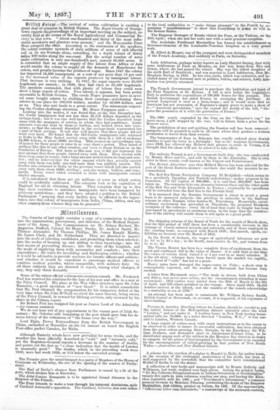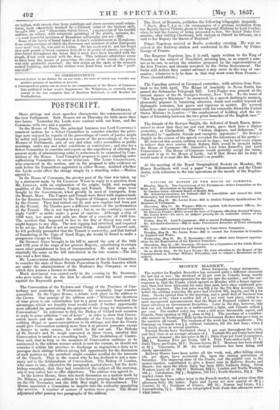gisttllautun.
The Gazette of last night contains a copy of a commission to inquire into the organization, government, and direction of the Medical Department of the Army. The Commissioners are Mr. ,Sidney Herbert, Mr. Augustus Stafford, Colonel Sir Henry Storks, Dr. Andrew Smith, Mr. Thomas Alexander, Sir Thomas Phillips' Mr. James Ronald Martin, Sir James Clark, and Dr. Sutherland. They are directed to inquire into the mode of selecting candidates, and promoting them when selected ; into the modes of keeping up and adding to their knowledge ; into the best means of preventing disease ; into the state of the hospitals, and the mode of supplying them with necessaries and comforts ; into their expenditure ; the rules for invaliding and discharging soldiers ; whether it would be advisable to provide asylums for lunatic officers and soldiers ; and whether it would be expedient to encourage medical officers to combine medical practice, where compatible, with military duty. On all these subjects they are directed to report, stating what changes, if any, they may think desirable.
Some of the minor official retirements occasion remark. Mr. Frederick Peel has received his solatium for the loss of his seat and office in a seat at the Privy Council. His place at the War Office devolves upon Sir John Ramsden,—a good, specimen of "new blood." It is rather remarkable that Mr. Peel obtained the compensation for his temporary defeat at the very time when Sir John M`Neill received the same honour, being sworn of the Privy Council, in reward for lifelong services, only crowned by his share in the Crimea report. Sir Robert Peel has resigned his post as Junior Lord of the Admiralty —for reasons unstated.
We do not hear yet of any appointment to 'the vacant post of Irish Secretary; Mr. Osborne still remaining at the post which gave him his famous survey of the rottenness of "the house over the way."
Lord Elgin, Envoy Extraordinary from the British Government to China, embarked at Marseilles on the 1st instant on board the English Post-office packet Caradoc, for Malta.
Although Easterly winds have now prevailed for some weeks, and the weather has been officially described as " cold " and "intensely cold," yet the Registrar-General reports a decrease in the number of deaths, and points out the fact as "a clear indication that the health of London is unusually good." The deaths, which in the preceding week were 1069, were last week 1038, or 113 below the corrected average.
The Premier gave the usual banquet to a party of Members of the House of Commons on Wednesday, the eve of the opening of the session of Parliament.
The Earl of Derby's absence from Parliament is caused by a fit of the gout, which detains him at Knowsley.
The Abbe Canino Bonaparte is to be appointed Grand Almoner to the Emperor of the French.
The Pope intends to make a tour through his temporal dominions, spite of Cardinal Antonelli's opposition. The Cardinal, however, .has sent orders to the local authorities to "make things pleasant" to the Poutit, by organizing "manifestations" to show that everything is going on well in the Roman States.
The Empress Dowager of Russia visited the Pope, at the Vatican, on the 25th April ; when she and her suite met with a most gracious reception.
The Archduke Ferdinand Maximilian has formed his establishment as Governor-General of the Lombardo-Venetian kingdom on a very grand scale.
M. Alfred de Musset, one of the youngest and most distinguished members of the French Academy, died suddenly at Paris, on Saturday.
Lady Ashburton, perhaps better known as Lady Harriet Baring, died with some suddenness at Pans on Monday, on her way home from Nice and Genoa, where she had passed the winter. She was the eldest daughter of the sixth Earl of Sandwich ; and was married to Lord Ashburton, then Mr. Bingham Baring, in 1823. In her own circle, which was extensive, and included many of our foremost men in polities, letters, and science, Lady Ashburton was greatly esteemed.
The French Government intend to purchase the habitation and tomb of the First Napoleon at St. Helena. A. bill is now before the Legislative Body to authorize the expenditure of 180,000 francs for this purpose. The British Government has aided France in =tinging the purchase. At present Longwood is used as a farm-house ; and it would seem that an American has got possession of Napoleon's empty grave to make a show of it—" American speculation," says the expose des motifs of the bill, "disputes the possession of it with the patriotism of France."
The 500/. yearly expended by the Czar on the "Emperor's cup" for Ascot races, a gift stopped by the war, will in future form a prize for the Moscow races.
The prohibition of any serf quitting the Russian soil has been removed : passports will be granted to serfs in all oases where they produce a written permission to travel from their owners.
The burgomaster of Saes in Bohemia has cruelly ordered sixty Jewish families to quit the town in a fortnight ; but as the Austrian Government, since 1848, has allowed any Hebrew that pleases to settle in Vienna, it is thought that his ukase will not be allowed to take effect.
The unlucky Transit is not a Government-built ship : she was constructed by Messrs. Mare and Co., and sold by them to the Admiralty. She is own sister to those cranky craft known as the Urgent and Perseverance.
The Bristol Advertiser says that Milford Haven has been selected forth° port of the Great Eastern steamer—nowhere deo could the monster be accommodated.
The Red Sea Steam Navigation Company El 7ofedjidieh—which seems to be a peculiarly Egyptian end Turkish undertaking—makes progress in its formation. Of the capital of 800,0001., it is said that 800,900/, has been taken up. The company is to run steamers between Sues 'and the other ports of the Red Sea and from Alexandria to Turkey ; eventually its operations will be extended from the Red Sea to the Persian Gulf.
It is surmised that the Russian Government is about to grant EL great boon to its moneyed subjects—the privilege to subscribe to the Railway scheme in other Russian cities besides St. Petersburg. Meanwhile, extraordinary excitement has prevailed at Theodosia, the proposed Southern terminus of the railways : every bit of land that could be bought has been purchased by speculators at enormous rates, in the hope that the construction of the railway will enable them to sell again at a great profit.
The shipping returns of the Board of Trade for the month of March show, that for that period of 1867 there has been a considerable increase in the tonnage of vessels entered inwards and outwards, and of those employed in the coasting trade, as compared with March 1836; that month, again, exhibiting an increase over the March of 1855.
In the North of Ireland, the wages of agricultural labourers are now Is. U. to ls. 8d.a day ; in the South, men receive 2s. 6d., and women from ls. to ls. 3d.
The Vienna Bourse has been in a complete fever of excitement from the great and continued fall in the value of shares : it is said that at one time the values of certain stock varied 3 or 4 per cent in as many minutes. It is the old story : schemes have been forced upon the market too rapidly, and a dread of" calls" has led to a panic.
Heavy rains have damaged the sugar-canes in Cuba ; a short crop is consequently expected, and the market at Havannah has become very excited.
A letter from Havannah says—" The trade in slaves, both from China and Africa, was never more active, nor the circumstances attending it MOTO melancholy : 1822 coolies were landed from the 30th of March to the 8th of April, and 3.52 others perished on the voyage. Since April 1866, 10,634 Asiatics arrived at the island, and the masters of the vowels acknowledge to a mortality at sea of 1789."
An attempt has been made to assassinate Mr. William Sydney Smith, British Consul at Havannah, on account, it is supposed, of his exposures of slave-trading.
Persons in America directing letters for London should be careful to put the initial letters of the Metropolitan district intended above the word "London," and not under it. A leading house in New York having transmitted bills for 70,000/, in a letter directed "London, W.C.," it was carried to London, Western Canada.
A large supply of cotton-seed, with exact instructions as to the course to be observed in order to insure its successful cultivation has been obtained from the great cotton-growing State, Georgia, by his Excellency Sir William Denison, and forwarded since to Lieutenant-Colonel Gray, to be distributed ampng such of the settlers in the Moreton Bay districts as desire to compete for the prizes of laud proposed by the Government to be awarded for the encouragement of cotton-grownig in that portion of New South Wales.—ifostralian and New Zealand Gazette.
A scheme for the erection of a statue to Handel in Halle, his native town, on the occasion of the centennial anniversary of his death, has been so well supported by the townsfolk that the committee have commissioned Heidel of Berlin to cut the statue.
A collection of rare books and manuscripts sold by Messrs. Sotheby and Wilkinson, last week, realized very high prices Among the printed books, "Dc Bry Collectio Perggrinationum in Indium Orientalem et Oceidentalem" twenty-five parts in nine volumes, wanting one map, and having the Elenchus reprinted, sold for 1501.; and "Tewrdanek's Adventures," a romance poem German by Melchior Pfinzing, celebrating the deeds of the Emperor Mayimilissi, fult edition, printed on vellum, for 1401. Of the manuseripte, " Officiorum Liber cum Calendario," a manuscript of the sixteenth century, on vellus, with twenty-four large paintings and above seventy small miniatures, nest exquisitely finished by a Flemish artist of the highest skill, bro lit 2401.; and " Diescoridis Opera Gneee," a manuscript of the twelfth ury, on vellum, with numerous paintings of the plants, animals, etc. —a most beautiful specimen of Byzantine calligraphy and art—&901. Some of the batch of bread baked at A-mm's establishment at Hongkong, from eating portions of which the Governor and numbers of other Europeans wore made very ill, was sent to Liebig. He has analyzed it, and has found that each pound of .bread contains from 38 to 42 grains of arsenic, so equally distributed throughout the bread that it must have been kneaded with the dough, if not even mixed with the flour. This intimate admixture seems to have been the means of preserving the eaters of the bread—the poison was only gradually absorbed-; the first action on the coats of the stomach caused vomiting, and thus the victims were freed from most of the "perilous stuff."



























 Previous page
Previous page